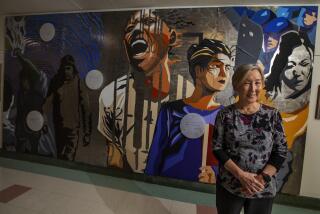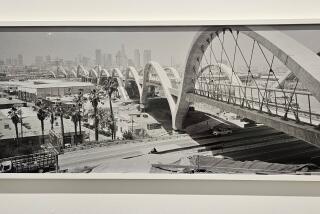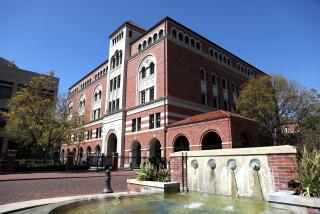Anne Friedberg dies at 57; professor at USC’s School of Cinematic Arts
Anne Friedberg, a USC professor who broadened the study of cinema by emphasizing its relationship to other visually oriented fields, including architecture, art history and digital media, died Friday at her home in the Hollywood Hills. She was 57.
The cause was colorectal cancer, said her husband, Howard A. Rodman, a screenwriter and USC professor.
Believing that “how the world is framed may be as important as what is contained within that frame,” Friedberg was known for her intellectually agile examination of the increasingly visual nature of contemporary culture and its representation on a gamut of screens: at movie theaters, on televisions and computers, on iPhones, BlackBerrys and other hand-held gizmos.
She explored the theme in two books: “Window Shopping: Cinema and the Postmodern” (1994) and “The Virtual Window: From Alberti to Microsoft” (2006).
She also helped create doctoral programs in visual studies at UC Irvine, where she taught for 18 years, and since 2003 at USC, where she was a professor in the School of Cinematic Arts, with joint appointments in English and art history.
“Anne was one of those rare individuals who with her remarkable intellect could integrate past, present and future,” Elizabeth M. Daley, dean of USC’s School of Cinematic Arts, said in a statement this week. “She was always challenging her colleagues and students to move forward and embrace change and innovation with courage and integrity.”
Friedberg was a principal architect of USC’s Interactive Media Arts and Practice program, which trains professionals in both the theory and practice of new media.
Until illness overtook her last year, she chaired the Critical Studies program in USC’s cinema school, which offers a cross-disciplinary approach to analyzing moving-image media.
With her angular Louise Brooks bob and penchant for wearing black, she intimidated some students until they came to know her, said Sheila C. Murphy, an assistant professor of screen arts and culture at the University of Michigan, who studied under Friedberg at Irvine. But the professor’s severe appearance belied a playful personality, evident in personal interactions, such as the time she surprised students with an impromptu cartwheel, as well as in scholarly work, such as the digital version of her book “The Virtual Window,” which explores the window as a metaphor for perception over five centuries.
Created with designer Erik Loyer, “The Virtual Window Interactive” is Friedberg’s experiment in uniting concept and form, which allows users to explore her ideas in a novel way. By clicking on a timeline and choosing from a variety of primary materials from artists ranging from Rembrandt to Hitchcock and beyond, “there is nothing to prevent a user from viewing a cinemascope film within the aperture of a video iPod,” a reviewer in the culture and technology journal Vectors wrote, “or watching excerpts from ‘I Love Lucy’ in the frame of a Renaissance-era stained glass window.”
Friedberg “helped to re-imagine cinema studies as part of a broader visual and critical discourse,” Murphy said. “Her own scholarship put film history, critical theory, architecture and art history into dialogue with one another as fields about visuality, spectatorship and mediation.”
Born in Urbana, Ill., on Aug. 29, 1952, Friedberg earned a bachelor’s degree in English at Wisconsin’s Beloit College before pursuing cinema studies at New York University, where she earned a master’s in 1977 and a doctorate in 1983.
She taught at several colleges and universities, include Rutgers and NYU, before joining UC Irvine’s faculty in 1985 as an associate professor of film studies.
Earlier this year, she was selected by the Academy of Motion Picture Arts and Sciences as an academy film scholar, which awarded her $25,000 to research and write a multimedia project about Slavko Vorkapic, a Serbian director and editor who achieved prominence in the 1930s for his montage work in such Hollywood films as “Crime Without Passion,” “Mr. Smith Goes to Washington” and “The Good Earth.”
In addition to her husband, her survivors include a son, Tristan; and a brother, Richard Friedberg of Bloomingdale, Ill.
A memorial service is pending. Memorial donations may be sent to the Liberty Hill Foundation, the Museum of Jurassic Technology or the Jewish Healing Center.
More to Read
Start your day right
Sign up for Essential California for the L.A. Times biggest news, features and recommendations in your inbox six days a week.
You may occasionally receive promotional content from the Los Angeles Times.







